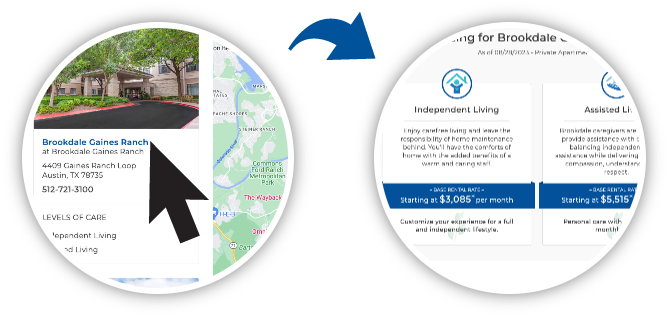- Home
- Brookdale Life
- Brookdale Blogs
- 6 Reasons Why Swimming Can Be Good for You
1. Swimming can help reduce the risk of osteoporosis
Osteoporosis is a chronic bone and joint condition that can turn a trip and fall into a trip to the hospital. Its incidence in adults increases with age: it’s estimated that osteoporosis affects 27% of women in their 70s and 35% of women in their 80s. Moreover, nearly half of adults ages 50 and older have a condition called low bone mass, an indicator that they may be at risk for osteoporosis. Although the numbers may make an osteoporosis diagnosis seem likely, science suggests swimming may help. According to a meta-analysis published by BioMed Research International, swimming may help improve bone mineral density in the spine and may be a good program for the clinical prevention and treatment of osteoporosis. Although research on the relationship between swimming and osteoporosis is nascent, it’s nothing to be ignored.
2. Swimming is gentler on joints
Swimming’s benefits on your bones aren’t just preventive. Rather, incorporating swimming into your routine may help you get relief now. According to a study published by the Journal of Rheumatology, swimming may help reduce joint pain and stiffness while improving muscle strength and functional capacity. Swimming can even help increase overall quality of life—who wouldn’t be happier with less pain and more mobility? Ultimately, the study concluded that the benefits of swimming exercise were comparable to cycling, a more strenuous sport. In other words, if you want the benefits of rigorous exercise with less joint strain, you better find your fins!
3. Swimming can help improve posture stability
If posture stability isn’t a term you’re familiar with, it’s time to add it to your vocabulary as you enter your late 50s or 60s. Research suggests that posture stability is a key indicator of how likely a senior is to fall. Fortunately, swimming may help improve a senior’s posture stability and other signals of brain-body coordination. According to a study published by the Journal of Nutrition, Health, and Aging, seniors who swim may have better balance and shorter reaction times. Given the nature of the movements required to swim, seniors who swim may experience improved accuracy of their repetitive movements and hand-eye coordination.
4. Swimming may help limit worsening of age-related pain
Although swimming is a mostly painless, low-impact activity, what makes aquatic exercise truly special is that it can help reduce your risk of injury and pain when you’re not in the water. In 2005, Stanford University published a longitudinal study on the effect of aerobic exercise, like swimming, on musculoskeletal pain in healthy seniors. Participants were divided based upon level of activity. After 14 years of collecting data, the study concluded that while all participants experienced a general increase in pain with age, those who participated in regular aerobic exercise like swimming experienced less musculoskeletal pain.
5. Movement in water helps build muscle
If you’re looking for a resistance workout without weights, look no further than the swimming pool. Exercising in water can be less strenuous than other forms of exercise because of the buoyancy water gives the body. However, your muscles still must work against the weight of the water. Water provides 12–14% more resistance than air, so even a leisurely stroll becomes a muscle-building workout under water.
6. Swimming may help improve mental health
With all the sunshine and good times, it’s pretty difficult to be unhappy in a pool. It may come as no surprise, then, that people who swim report marked improvements in mental health. Is there something about swimming that just makes life go, well, swimmingly? According to a comparative study conducted by the City University of New York, participants who swam reported acute decreases in anger, confusion, tension and depression compared to non-swimmers. Likewise, an article published in Sports Medicine reported that the psychological benefits garnered from aerobic exercise like swimming are “comparable to gains found with standard forms of psychotherapy.”
So, if you’re looking to brighten your outlook on life, try looking through goggles next time.
The above content is shared for educational purposes only. You must consult your doctor before beginning any exercise or fitness program or acting on any content on this website, especially if you have a medical condition. The content is not intended to be a substitute for professional medical advice, diagnosis, or treatment. Never disregard professional medical advice or delay in seeking it because of something you have read on our site.
Categories
- Alzheimer's & Dementia
- Caregiver's Corner
- COVID-19
- Health, Safety and Wellness
- Financial Well-Being
- Passion & Purpose
- The Journey to Senior Living
- Trending Now
- Socialization & Relationships
- Brookdale Solutions
- Brookdale Vision and Growth
Archives
View All
- October 2025
- September 2025
- August 2025
- July 2025
- June 2025
- May 2025
- April 2025
- March 2025
- February 2025
- January 2025
- December 2024
- November 2024
X
Let us help find the right community for you!
Complete the form and a Senior Living Advisor will be in touch!
Inside Brookdale Communities
See what’s happening on our community Instagram pages
Brookdale has communities near you!



